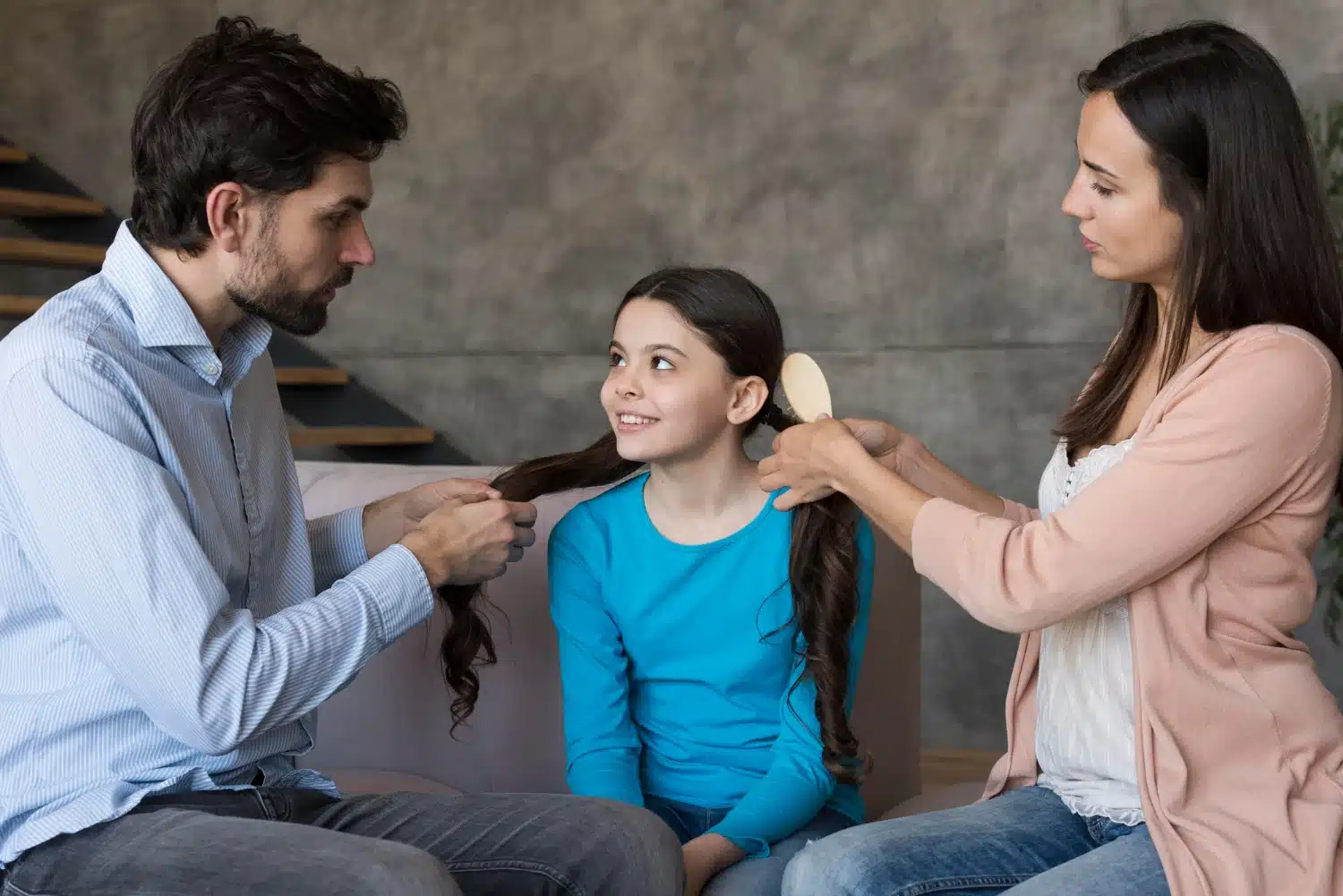Do you want to raise a happy child? Of course, you do! As a parent, we want to ensure our children are healthy and happy. Raising a happy child isn’t easy, but it is worth it. In this blog post, I will discuss tips on how to raise a happy child. Follow these tips and see how your child’s happiness improves!
Give Your Child Plenty of Love and Attention
One of the best things you can do for your child is to give them plenty of love and attention. Let them know that you love them unconditionally and will always be there for them. This will help them feel secure and loved, two essential ingredients for happiness.
In addition to showing your child love and attention, you should also make sure to spend quality time with them. This means giving your undivided attention to your child. Play games with them, read together, or talk. These quality interactions will help strengthen your bond and create a happier home environment.
Finally, don’t forget to tell your child how proud you are of them. This will boost their self-esteem and make them feel good about themselves. A happy child is a confident child!
Encourage your Child to Express their Feelings
As a parent, it’s natural to want your child to be happy. But how can you encourage them to express their feelings healthily? We can do this by modeling emotional intelligence ourselves. Let them see you acknowledging and constructively dealing with your own emotions. This will help them understand that feeling angry or sad is okay and that we can healthily express these feelings.
It would help if you also created opportunities for them to share their feelings with you. Ask open-ended questions about their day, and listen to their answers. This will help them feel comfortable talking to you about their emotions. Finally, make sure to praise them when they express their feelings positively. This will reinforce the behavior and help them express their emotions positively.
Encourage Children to Talk about What’s Going on.
Sometimes just talking about what’s bothering them can help them feel better.
As a parent, asking them questions is one of the best ways to encourage your child’s speech development and language skills. Repertoire-based question-asker guidebook.
Help them find other outlets for their feelings.
For example, if they’re angry, they might benefit from hitting a pillow or running. If they’re sad, they might like listening to music or writing in a journal.
Teach them how to problem-solve
If there’s something specific that’s bothering them, help them come up with a plan to deal with it. This could involve coming up with a list of possible solutions and then choose the one that would work best.
Encourage Positive Self-talk
Help your child identify their negative thoughts about themselves and then reframe them in a more positive light. For example, if they’re thinking, “I’m so stupid,” you might encourage them to think, “Everyone makes mistakes sometimes. I’m just learning, and I’ll do better next time.”
Point Out the Positives:
When your child is feeling down, help them focus on the positive things in their life. This could involve brainstorming a list of things they’re grateful for or things that make them happy.
Model Healthy Coping Mechanisms:
Your child needs to see that you healthily deal with your own emotions. This means not bottling up your feelings or using unhealthy coping mechanisms, like drinking alcohol or smoking cigarettes.
Help your Child Develop a Strong Sense of Self-esteem
One of the best ways to help your child develop strong self-esteem is to encourage them to pursue their interests and talents. When children feel good about themselves, they’re more likely to be happy.
Another way to help your child develop strong self-esteem is to praise them for their accomplishments, no matter how small. Every time your child does something well, tell them! This will help them feel good about themselves and their abilities.
Finally, try to avoid criticizing your child too much. You can still love your child even if they do something wrong! Just go with the flow and try not to make them feel bad about themselves. For example, instead of saying, “You’re so messy!” try saying, “It looks like you had a lot of fun playing with your toys!”
Teach your Child How to be Assertive
It’s so important that our children learn how to be assertive, not aggressive. Assertiveness is the ability to stand up for yourself while respecting others. It’s a skill that will help your child in all aspects of life, from making friends to dealing with difficult situations.
There are a few things you can do to help your child learn how to be assertive:
- Encourage them to express their feelings, both positive and negative.
- Teach them how to listen to others and respect their opinions, even if they don’t disagree.
- Help them practice saying “no” in a respectful way.
- Encourage them to stand up for themselves and others, even if it means speaking up in front of a group.
- Most importantly, model assertiveness yourself! Parents and caregivers need to set an example of assertiveness. Children learn by watching how we handle ourselves, so if you want your child to grow into a more confident individual, then it’s time that YOU got some confidence!
Assertiveness is a skill that will benefit your child in all aspects of their life.
Encourage your Child to be Independent
Being independent doesn’t mean doing everything on their own. It means having the ability and confidence to try new things, even if they might fail. As a parent, you can encourage your child’s independence by giving them opportunities to make small choices.
For example, you can ask them what they’d like to wear today or give them breakfast options. You can assign them more responsibilities around the house as they get older, like setting the table or feeding the pets. Allowing your child to make decisions and choices will help them feel confident and independent.
Reward your child for good Behavior
One way to encourage your child to keep up the excellent work is to reward them when they do something you approve of. This could be a special treat, extra playtime, or verbal praise. Whatever you choose, ensure that the rewards are immediate and consistent so that your child knows exactly what they did to earn them.
Rewarding your child for good behavior is a great way to encourage them to keep up the excellent work. Make the rewards for good behavior immediate and consistent. This will help your child know what they need to do in order to earn them, while also building self-esteem! This could be a special treat, extra playtime, or verbal praise. Whatever you choose, ensure your child knows what they did to make the reward.
Consistent rewards will help your child understand what behavior is expected from them. This will help them be happier since they will feel a sense of accomplishment when they behave as you have asked them to.
Encourage Them to be Curious and Explore the World Around Them
A child’s curiosity leads them to explore their world. They are always looking for something new, an experience, or an object of interest! Encourage this natural curiosity by providing opportunities for them to explore their environment. Take them on nature walks, let them play in the backyard, or take them to the park. This will help them learn about the world and develop a sense of wonder.
Helping your child explore the world around them will help him develop into an adventurous adult. So please take advantage of their natural curiosity and provide opportunities for them to know about the world around them. You’ll be glad you did!
Teach Them How to Manage their Emotions
This is a skill that will serve them well throughout their life, and it’s one that you can start guiding them from a young age.
There are a few ways you can go about teaching your child how to manage their emotions:
- Please help them to identify their feelings. This can be done by labeling emotions for them when they’re feeling them or by teaching them to recognize emotions in others.
- Teach them how to express their feelings healthily. This could involve talking about their feelings, drawing pictures, or writing stories.
- Please help them to understand and cope with difficult emotions. This could involve teaching them relaxation techniques or helping them to realize that it’s normal to feel sad or angry sometimes.
- Please help them to develop a positive outlook. This could involve teaching them to find the silver lining in every situation or helping them to focus on the good things in their life.
Instill in Them a Sense of Gratitude
By practicing gratitude, parents can give their children a sense of safety, well-being, and happiness. One way to do this is by setting aside time each day for the family to share things they’re thankful for.
You can also model gratitude to your partner, children, friends, and colleagues. Not only will this help create a more positive outlook in your life, but it’ll also rub off on your kids.
Teaching kids to be grateful has been linked with increased levels of happiness, better sleep, and improved relationships. So instilling this virtue early on will set them up for a happier, more fulfilling life.
The Need for Physicality Must be Provided.
Give your kids the best possible start by taking care of their physical needs. This includes food, shelter, and clothing to ensure they can survive no matter what happens concerning emotional or mental health over time.
While it may seem like a no-brainer, meeting your child’s basic needs is essential to their happiness and well-being. So make sure you’re doing everything possible to provide for them this way.
Attempts Over Perfection
One of the best ways you can do for your child is to realize that it’s okay to make mistakes. Help them understand that everyone messes up sometimes and that it’s not the end of the world.
What’s important is that they learn from their mistakes and try not to repeat them in the future. This will instill in them a sense of resilience and perseverance, two essential traits for happiness.
So instead of putting pressure on your child to be perfect, encourage them to strive for excellence. This will help them develop into well-rounded, happy adults.
Allow your Child to Have a More Fun Time.
This means letting them play more and spend less time on stressful or tedious things. Of course, this doesn’t mean that you should let your child do whatever they want all the time – but it does mean giving them some freedom to choose what they do, within reason.
Gentle Parenting, Don’t Yell.
Yelling creates an environment of fear and tension and can damage your relationship with your child. If you get angry, take a deep breath and try to calm down before speaking to your child. You may also want to remove yourself from the situation until you feel more level-headed.
Be a Good Role Model
Your child will learn from your example, so it’s nice to model the behavior you want to see in them. If you’re always complaining and putting yourself down, your child will likely develop similar negative thought patterns. Instead, focus on being positive and speaking kindly to yourself and others. This will help your child develop a more positive outlook on life.
Help your Children Learn How to Forgive.
It is an essential life skill. Teach them how to apologize when they have done something wrong and to forgive others who have hurt them. Forgiveness does not mean forgetting what happened or condoning the behavior. It means letting go of anger and resentment and moving on with your life.
Share your Family History with your Children.
Sharing family history can be fun to connect with your child and help them understand where they come from. It can also be a bonding experience for the whole family.
There are many ways to share family history with your child. You can start by telling them stories about when you were a child or about your parents and grandparents. You can also show them pictures and keepsakes from your childhood. If you have family members willing to share their own stories, that can be an excellent way to get your child to learn more about their family history.
You can also help your child learn more about their family history by taking them on trips to visit relatives or places important to your family. This can be a great way to show your child how different parts of the world can be and to help them understand where their family came from.
Chores Tasks
Another way to help your child feel happy and connected to their family is to involve them in household chores and tasks. This can help them feel like they are contributing to the family and give them a sense of achievement in their work. It can also be a fantastic way to teach them responsibility and to help them develop a strong work ethic.
There are many ways to motivate your child in chores and home tasks. You can start by giving them simple tasks, such as to set the table or help to put away groceries. You can give them more complex tasks as they get older, such as laundry or cooking dinner. You can also offer rewards for completing chores, such as allowing them to choose a movie to watch or pick out a new toy.
Incorporate family rituals into your routine.
Here are some suggestions:
- Every Saturday and Sunday, have breakfast as a family.
- Go on evening walks
- Make some cherished family memories—arrange a board game night!
- Once a year, go camping with your family.
- Make supper together as a family.
- Tell your child/children a bedtime story.
- Pray together as a family.
Routines and rituals help to bring a sense of stability and order to our lives. They can also be a fantastic way to connect with our families and create lasting memories.
Happy parenting!

















